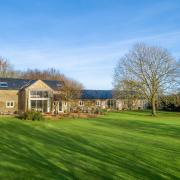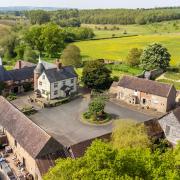Wick Court in Arlingham is no ordinary farm. Over the past 20 years, it has welcomed inner-city children, offering them fresh air, fresh food, and the chance to get up close to animals they’ve only ever seen on TV. For many young visitors, those seven days of country-living will change their lives for ever. Katie Jarvis learns more about the charity, Farms for City Children

Eight children are in the stable-yard at Wick Court, grooming four horses placid in the warmth of an early summer sun. These nine- and 10-year-olds are clad in practical wellies (busy floral prints; dark blues and greens), brushes clutched in small hands that gently arc over gleaming coats, dust-motes flying.
Their school – if not home – is in the borough of Kensington and Chelsea...
But, no. Not that part.
Last summer was very different from the quiet rusticity of today. Tonight, tucked up in bunk-beds, they’ll look out of dorm windows towards unpolluted starlight; last summer, some from their windows saw the horrors of Grenfell Tower lighting up the night sky.
These children might live cheek-by-jowl with mansions and penthouses… but ‘No’ once more: those are not where they call home.
Blane stops mid-brush and turns dark eyes on me. “I’ve never been this close to a horse before. When I hug her, it somehow feels as if she is hugging me back.”
Phoenix nods. “It feels like my horse likes me… Even if she doesn’t.”
Noel is busy brushing the granddaddy of horses, 27-year-old Hugo, whose eyes are drooping inexorably in an impromptu siesta. “I’ve seen horses in Holland Road but I’ve never groomed one before,” Noel explains, as he kindly encourages Rami to join in. “Put your arm around him like that, Rami, and do the brush,” he says, fearless, though this gentle beast of a horse dwarfs him.

The three grooming Cuckoo (whose dad came an impressive third in the Derby) are a multi-cultural world in themselves. Jovan has family in Uganda; Ayoub in Morocco.
“And I was born in Paris,” says Jin, with his beautiful, shining ponytail. “I’m Portuguese from my mum, and Chinese and French from my dad.”
“Are you impressed, Cuckoo?” I ask.
“Yes,” Jovan answers on her behalf, in a special horse-voice.
Do they have animals at home?
“I’m in a flat,” Ayoub says.
“Sometimes there are mice in my house,” ventures Jovan.
Mel Smallman, who looks after the horses at Wick Court, is grinning as she supervises these calm, caring children. “If you’d asked them to stand still like this when they arrived last Friday, they couldn’t have done it!” she says.

Suddenly, out of nowhere, two of the girls quietly begin singing.
...Look out ‘cause here I come
And I’m marching on to the beat I drum...
And then, unprompted, others join in: a harmony of piping voices.
I’m not scared to be seen
I make no apologies, this is me.
One of the few non-singers tugs; he wants to tell me something important. “When I’m sad,” he says, “if I had an animal, I could talk to it to make me feel better.” He pauses, wondering how to make things clearer. “It’s like a safe person, if I feel sad.”
A safe person? Why on earth would a nine-year-old need to know about safe people?

But the horse he’s grooming offers no comment; she simply stands there, with the twitching ears of a constant listener.
__________________________________________________
The drive down to Wick Court meanders past English hedgerows – delicately white of hawthorn, blackthorn and spiky field maple – that have never dabbled in 21st century life; up to a moated farmhouse of Elizabethan frontage that politely inquires, “2018? Really? I’m afraid the clocks stopped here many years ago.”
Heather Tarplee, farm school manager at Wick Court, sits me down at a huge wooden table in the staffroom and hands over a mug of steaming coffee. Beside us is the wooden lattice-work that once separated cheese from animals; on the window-ledge is an old black-and-white photograph of a mahogany herd of Gloucester cows.
This year, Wick Court celebrates two decades of welcoming inner-city children onto its buttercup-strewn pastures and into its Enid Blyton farmyard; 20 years of being a part of the innovative Farms for City Children charity.
This latest crew of 26 ‘Year Fives’ is no different from the thousands of children who’ve already benefited from a week in this lung-expanding environment.
They arrived five days ago, “And a lot of them started out quite nervous of the animals. Some struggled to run in a pair of wellington boots. Many are not used to doing any physical activity – certainly not barrowing, shovelling, sweeping. We work them hard,” Heather – herself a former teacher - says, with a smile.
She loves the effervescent enthusiasm that particularly characterises London children. “They are lively; they are confident; they are curious. They’re not always easy but there is something about them.”

Invite them to play in a field on their Friday arrival, and they’re utterly perplexed.
What do you do in a field? they puzzle.
By Sunday afternoon – when they’ve farmed non-stop and eaten their roast dinner of Wick Court meat – the mood has transformed. “We’ll take them on a long walk, up to the top of Barrow Hill where they can roll down. And you can see them suddenly thinking, ‘Actually, this is fun!’”
The charity was founded in 1976 by the author Michael Morpurgo and his wife, Clare. Their insight was that urban children – some of whom suffer deprivation of material comforts; others of security and care; all of them deprivation of experience – could be transformed by a week of life on a farm: breathing fresh air, eating fresh food, caring for animals, exerting themselves physically, working as a team.
The Morpurgos opened their first farm at Nethercott House in Devon; and their second was Lower Treginnis, a 700-year-old sheep farm on the Pembrokeshire coast.
When Wick Court – sad and neglected over many years – showed itself in need of a new owner, the Morpurgos demurred.
Once a fishing lodge for Berkeley Castle (salmon, eel, flounder and lamprey, scooped from the nearby Severn, were plentiful consolation during meat-free Lent), the house has a history dating back at least to medieval England. Its final owners, the Dowdeswell sisters and brother, had died unmarried and childless – the last sister in 1985. In her will, their intent for their historic home was clear: it was to be held in trust ‘for the benefit of society’. Unfortunately, that generous thought was not backed by money to shore up its sagging floors and leaking roof.
But fate had a plan. The architect summoned from Bristol to give a gloomy report on Wick Court’s moribund condition just happened to have worked on converting the Morpurgos’ farm in Pembrokeshire. “And we’re still working to pay this last one off!” they protested, when he persuaded them ‘just to have a look’. “But, like everyone else,” Heather says, “they walked through the gate and fell in love with the place.”

Some massive fundraising later – much of it by Clare herself – and the Princess Royal opened it for the first intake on June 22, 1998.
It was a mutual rescue. The children saved the house; the house repays that compliment by saving numerous children.
The stories abound. Such as the little girl a few weeks ago – an elective mute – who hid behind her curtains of long hair and would never look anyone in the eye.
“She had to tie her hair back to go on the farm for health and safety; by the end of the week – though she still didn’t speak - she sat at breakfast with her hair tied up, even though it didn’t need to be, a big smile on her face, communicating with her friends by writing on paper. She had just come to life.”
It’s not all fairy-tales, of course.
Heather shakes her head. “Some of them could do with more than a week. And some you’re sending back to...you know.”
__________________________________________________
You could forgive Wick Court for harbouring a few spirits. Some children claim to have ‘seen things’. Some teachers, too, who once – a group together – saw figures in Victorian garb, making butter in the kitchen.
But the only emotion I can feel, as the children show me round the building, is a possessive pride.
I have to see every single room; every last cupboard; every bathroom, every toilet. The boys’ dorm – known as Queenies – is where Elizabeth I is once said to have slept, her paramour (the dashing Earl of Leicester) creeping to her side via a secret passage from the attic. The children point to decorative strapwork – a rustic copy of a noble art – that adorns the room. They’re deliciously scandalised when they use my presence as an excuse to peer into the teachers’ bedroom and discover unmade beds.
What do they like about Wick Court?
“The space!”
“The food!”
“The sheep!”
What don’t they like?
“Missing my family,” says Indigo.
“The onions,” says Ruby-Sue.
“Definitely the onions,” Harry agrees.
Despite the onions, there’s no hesitation as they run off to lunch. Today, it’s vegetarian day (cooked by their outstanding head chef, Nicky Massey): a tumble of home-grown vegetables in a cheesy lasagne, with a syrup pudding to follow. But most of them will just as happily eat lamb, clearly understanding the relationship between the meat and the animals they tend.
There’s even a dead chick beside the incubator, where its fluffy live siblings are basking in the warmth.
“We don’t shy away from death here,” says stockman, Dave McEvansoneya, when I ask him about it.
And why would you – I suddenly think – when many of these children have faced much starker truths than a farm’s.
__________________________________________________
Lee Johnson – deputy head at St Clement and St James, with a responsibility for special needs – is sitting with me in the gathering sunshine. In the background, we can hear the calls and whistles of his young charges. He joined the school four years ago, and this is his fourth trip to Wick Court. “I’m very lucky,” he grins.
Here, 120 miles away, these children have found a paradise. “But don’t get me started,” he says, calmly, feelingly, about the inequalities they’ve left behind: an area where super-basements rub alongside families who struggle to meet their monthly rent.
“We have children from very difficult backgrounds; where parents have mental-health issues; where they are in very low-income homes; where parents are struggling to get long-term housing. On top of that, we have the whole issue around the Grenfell Tower fire. We were lucky that we weren’t one of the schools where we lost children or we lost parents; but a lot of our families were intimately connected with the community and with families that have suffered loss.”
Counselling has been part of daily life ever since.
“At that age, there are certain things that you accept as a given; one of those is that your home is safe.”
He pauses. “Actually, for a lot of them, sometimes home is not the most stable environment.”
The school itself has been coming to Wick Court for a decade; but Lee tells of transformations he has seen personally. Sometimes, it’s hard to persuade parents to let their children come along: “A lot of the children are quite cossetted; why wouldn’t they be, when you’ve had something like Grenfell take place.”
But, when they do come, things happen.
Like the child last year, on the autistic spectrum – anxious and lacking in self-confidence – who complained about walking to Oldbury, the next-door dairy farm, to see cows being milked: “I can’t do this! I’m so tired!”
“By the third day, as soon as we set off, he was the first up the hill: ‘Come on guys!’ And partly because of his autism, he found it much easier to remember the intricacies of all the processes: how many jugs of water did we need to make up the supplements for the calves? How many kilos of powder?
“He absolutely blossomed.
“It sounds like hyperbole,” Lee adds, “but I would say that this week is the most valuable of their primary school careers.”
We have to stop; we’re being called. The children are ready for their next adventure. Maybe leading recalcitrant lambs – fluffy as cuddly toys – round the perry pear tree where the little owls live, as if prize-winning handlers at a country show. Or weighing the curly-tailed, lop-eared Old Spot pigs, knowing that 85kg means sausages.
There are challenges ahead for this wonderful charity. School budgets are being slashed; adult helper-numbers cut. It’s a worry.
But they know that, like the farm itself, they need to plough on.
“Can I have a volunteer?” Dave asks, as he gets the crate ready to weigh the next pig.
And every single child in the group madly waves a hand.
• To find out more about Wick Court and the Farms for City Children charity, visit farmsforcitychildren.org.



























